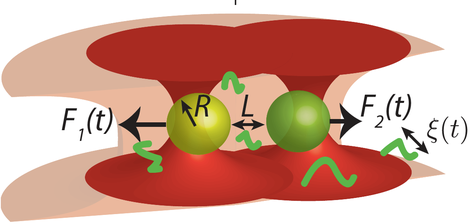Marie Skłodowska-Curie Action IF NEQLIQ

Introduction
The Marie Sklodowska-Curie Action “NEQLIQ-Non-equilibrium features of small systems within critical liquids” is a Standard European Fellowships that will support the fundamental experimental research of small systems in contact with non-trivial thermal baths.
NEQLIQ aims at unravelling how the small systems exchange energy in the presence of long-ranged interactions between the system and the surrounding environment.
With this purpose, we will develop a multidisciplinary experimental setup that will combine micromanipulation techniques with the ability to change the local temperature several orders of magnitude faster than its intrinsic relaxation time.
This project will be carried out by Dr. Ignacio A. Martínez within the Liquid Crystal and Photonics group led by Prof. K. Neyts at UGent.
Project description
Nowadays, miniaturization represents one of the biggest scientific challenges. Small systems, which are ranged from some nanometers to several microns, work at the edge of thermal energy which gives them unavoidable features. Understanding the consequences of such miniaturization, not only in size but also in time and energy, is required for optimizing the performance of artificial nanodevices and for understanding their natural counterparts.
During the last twenty years, and thanks to the explosion of micromanipulation techniques, our knowledge about the dynamics and energetics of small systems has exponentially grown. However, very most of the experimental results have been obtained using trivial thermal baths whose properties can be nicely modeled by white Gaussian forces.
NEQLIQ aims to contribute to the European Research Area (ERA) by developing new fundamental knowledge about the features of small systems. Particularly, NEQLIQ will focus on the dynamics and energetics of small systems within critical baths. Critical interactions have been proposed to play a key role in the performance of living systems, and they have great perspectives to be applied to artificial devices.
NEQLIQ is based on: I) micelle-solvent mixtures to enhance the intrinsic features of a critical bath, II) a combination of microrheology and dynamic light scattering for determining the impact of confinement or inclusion of tracers in the viscoelastic features of the fluid, and III) the study of the statistics of the energy transfer by non-equilibrium thermodynamic protocols.
Objectives
The main objective of NEQLIQ is to assess how critical interactions influence the dynamics and energetics of the small systems. The final goal will be achieved once we identify the minimal effective model that characterize the coupling between a critical bath and a set of colloidal particles. To reach the main objective, the project will focus on more specific objectives:
- Quantify the changes in the viscoelastic features of the bath at different distances of the criticality. We will pay special attention to how the boundary conditions, i.e., the chemical affinity of the intruder, affects the effective viscosity. Confinement of the fluctuations and its consequences in the viscoelasticity of the fluid will be also carefully studied.
- Quantify the probability density function of any thermodynamic parameter (work, heat, or entropy creation) along a thermodynamic pathway. The system bath plus particle will be perturbed by temperature quenches and by dragging the tracer within the liquid. We will use stochastic thermodynamics framework to measure thermodynamic exchanges between the system and the environment (work, heat, entropy creation,...). Out-of-equilibrium measurements will be interpreted using Fluctuations Theorems whose validity will be checked in our system.
Role of Ghent University
NEQLIQ will merge the expertise of the host group in surfactants, micelles, and microfluidics, together with the background of the applicant using optical micromanipulation techniques, to unravel the fundamental features of the energetics of small systems. An ambitious training program including several new scientific and soft skills to be transferred to the applicant is also envisaged. Moreover, the applicant will transfer his knowledge to the host group and will be the link between them to forge future collaborations.
Website
To be announced
Contact
Prof. Kristiaan Neyts.
Department of Electronics and Information Systems.
T+32 9 264 3381
E kristiaan.neyts@ugent.be
Dr. Ignacio A. Martínez
Department of Electronics and Information Systems.
E ignacio.martinez@ugent.be